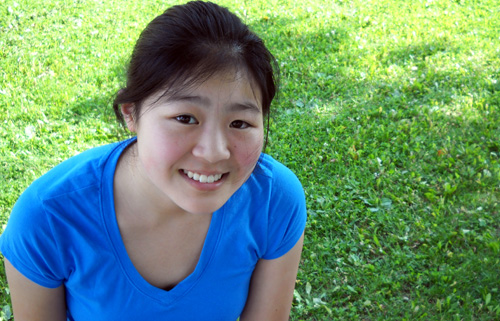
Even Beatrix Wang has the odd brain freeze.
“I go to do something but then I completely forget what I’m doing,” says the Guelph teenager.
She’s hoping that doesn’t happen this week. Wang, 16, will be the lone Canadian student competing at the International Brain Bee, a chance for 20 teenagers from around the world to test their brain smarts against each other.
The competition will take place Aug. 8 to 10 in Washington, D.C.
Wang qualified for the international event by winning the Canadian Brain Bee held at McMaster University this spring. Earlier she won the local competition held on the U of G campus.
The annual brain-busting competition tests high school students’ knowledge of grey matter, including such topics as intelligence, emotions, memory, disorders, addiction and brain research. It’s run by a non-profit foundation called Mankind for International Neuroscience Development.
This week, Wang and other contestants will be tested with question-and-answer sessions, asked to diagnose mock patient problems, and challenged to identify brain parts and tissues as well as their functions.
She says she’s most confident about the neuroanatomy portion. Since April, she has visited U of G’s Summerlee Science Complex once or twice a week to study sheep brains, pore over stained sections and slides, and read up about the brain. She’s working with mentor Krista Mitchnick, a PhD student in psychology and neuroscience.
“Krista’s helped me out a lot,” says Wang.
She’s more nervous about the diagnosis challenge, in which actors mimic symptoms of disorders and contestants have limited questions and time to figure out the problem. “It’s kind of intimidating having to deal with patients.”
Wang will begin Grade 12 at John F. Ross Collegiate in the fall.
She competed for the first time in the regional brain bee last year.
This year’s national contest among 13 students came down to a “sudden death” final with one other competitor. Her opponent finally slipped up on a question – but even that wasn’t the end.
Referring to the study guide used by contestants, Wang says, “according to the book it was wrong, but according to the Internet it was correct.”
The judges decided to tally up both contestants’ total scores for the day. “My marks were higher,” says Wang. “It was a relief, a nice end to a stressful day.”
She won a trophy, $1,500 and an internship in a neuroscience lab, as well as her ticket to this week’s mind-bender in Washington.
Wang began learning about mental matters only when a teacher at school mentioned last year’s contest. “Before the brain bee, I hadn’t considered the brain.”
Now she’s fascinated by the complex organ and the whole field of neuroscience.
“I think that the brain is really cool. It’s very intriguing. The brain is the part of our body that controls us and makes us human, but it’s also probably the part of the body that we know the least about.”
She hasn’t made up her mind yet, but is thinking about studying biology and maybe medicine. “If I were to go into medicine, I would like to be a neurologist.”
Her dad is U of G computer science professor Fangju Wang.
When she’s not boning up on the brain, she plays violin and likes writing short stories and poetry.
Mitchnick helped run the regional event on campus this spring. That’s where she met Wang and volunteered to serve as her study coach for this year’s national competition.
They’ve pored over dissected specimens, including a dog’s spinal cord and a cow’s eyeball. “Those are pretty cool,” says Mitchnick, who completed an undergrad at Guelph.
She confesses she’s a bit envious of Wang. “Part of me feels I’m living through her. I wish I could have done something like this when I was in Grade 11.”
Mitchnick says the brain bee introduces neuroscience into high school, giving young students a look at education and career options that they might not otherwise know about. “It’s a huge, booming research area.”